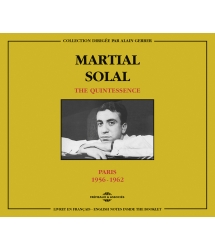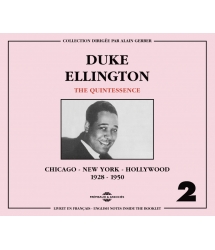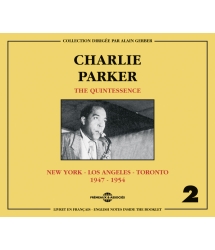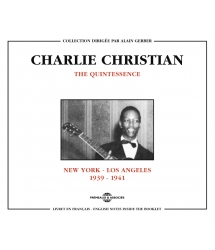- Our Catalog
- Philosophy
- Philosophers of the 20th century and today
- History of Philosophy (PUF)
- Counter-History and Brief Encyclopedia by Michel Onfray
- The philosophical work explained by Luc Ferry
- Ancient thought
- Thinkers of yesterday as seen by the philosophers of today
- Historical philosophical texts interpreted by great actors
- History
- Books (in French)
- Social science
- Historical words
- Audiobooks & Literature
- Our Catalog
- Jazz
- Blues
- Rock - Country - Cajun
- French song
- World music
- Africa
- France
- Québec / Canada
- Hawaï
- West Indies
- Caribbean
- Cuba & Afro-cubain
- Mexico
- South America
- Tango
- Brazil
- Tzigane / Gypsy
- Fado / Portugal
- Flamenco / Spain
- Yiddish / Israel
- China
- Tibet / Nepal
- Asia
- Indian Ocean / Madagascar
- Japan
- Indonesia
- Oceania
- India
- Bangladesh
- USSR / Communist songs
- World music / Miscellaneous
- Classical music
- Composers - Movie Soundtracks
- Sounds of nature
- Our Catalog
- Youth
- Philosophy
- News
- How to order ?
- Receive the catalog
- Manifesto
- Dictionnary











- Our Catalog
- Philosophy
- Philosophers of the 20th century and today
- History of Philosophy (PUF)
- Counter-History and Brief Encyclopedia by Michel Onfray
- The philosophical work explained by Luc Ferry
- Ancient thought
- Thinkers of yesterday as seen by the philosophers of today
- Historical philosophical texts interpreted by great actors
- History
- Books (in French)
- Social science
- Historical words
- Audiobooks & Literature
- Our Catalog
- Jazz
- Blues
- Rock - Country - Cajun
- French song
- World music
- Africa
- France
- Québec / Canada
- Hawaï
- West Indies
- Caribbean
- Cuba & Afro-cubain
- Mexico
- South America
- Tango
- Brazil
- Tzigane / Gypsy
- Fado / Portugal
- Flamenco / Spain
- Yiddish / Israel
- China
- Tibet / Nepal
- Asia
- Indian Ocean / Madagascar
- Japan
- Indonesia
- Oceania
- India
- Bangladesh
- USSR / Communist songs
- World music / Miscellaneous
- Classical music
- Composers - Movie Soundtracks
- Sounds of nature
- Our Catalog
- Youth
- Philosophy
- News
- How to order ?
- Receive the catalog
- Manifesto
- Dictionnary
17 NOVEMBRE 1962
Ref.: FA5768
Label : Frémeaux & Associés
Total duration of the pack : 1 hours 9 minutes
Nbre. CD : 1
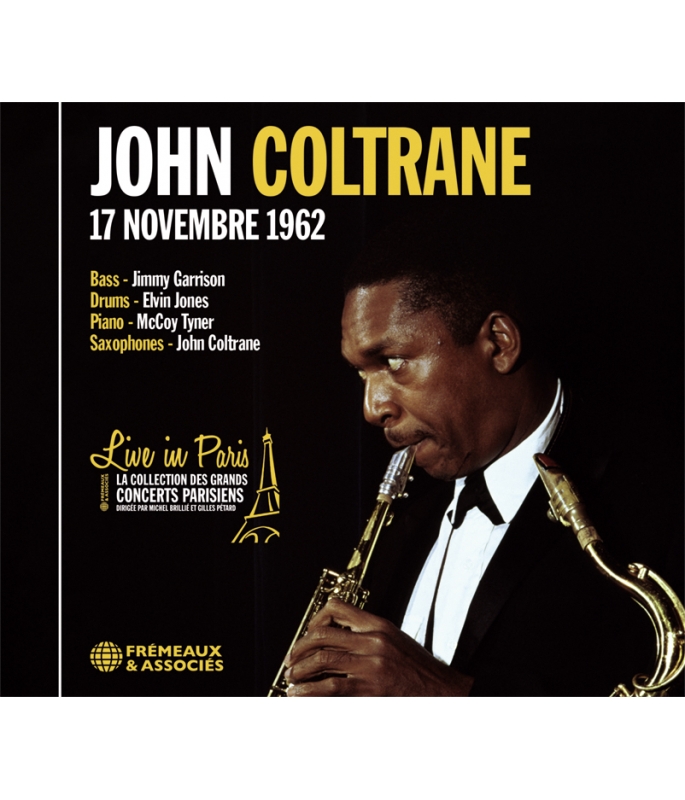
17 NOVEMBRE 1962
- - RECOMMANDÉ PAR LIBÉRATION
- - CHOC JAZZ MAGAZINE
- - LA DISCOTHEQUE IDEALE de CLASSICA
- - RECOMMANDÉ PAR L'HUMANITÉ
- - **** LE SOIR
17 NOVEMBRE 1962
An absolute icon. After a blazing career, John Coltrane’s aura still shines brightly and the revolution he brought to music continues to influence generations of musicians. This live recording made at the end of 1962 features saxophonist Coltrane’s “historic quartet” – believed by many to be the greatest small group in jazz history – with the leader accompanied by bassist Jimmy Garrison, pianist McCoy Tyner and drummer Elvin Jones. The music on this CD is a demonstration of the rhythmical elegance, incandescent fervour, visceral inspiration and extraordinary flights of harmony that made this group so remarkable, this previously unreleased recording illuminates the unsurpassable ideal of modern jazz. Patrick FRÉMEAUX
The Live in Paris collection by Michel Brillié allows listeners to hear previously-unreleased recordings (made at concerts and private- or radio-sessions) by the great 20th stars in jazz, rock & roll and song. These “live” takes, and the artists’ rapport with their audiences, gives these performances an additional soul and sensibility in counterpoint to the rigorous demands of studio recordings. Particular care was taken when restoring the sound of these tapes in order to meet CD standards while preserving the original colours of the period. Patrick FRÉMEAUX & Gilles PÉTARD
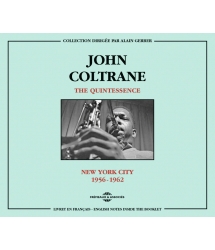
NEW YORK CITY 1956-1962

LIVE IN PARIS - 21 MARS / 11 OCTOBRE 1960
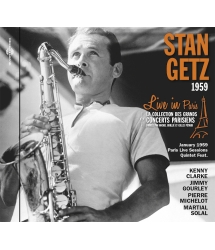
AVEC, STAN GETZ • KENNY CLARKE • JIMMY GOURLEY •...



-
PisteTitleMain artistAutorDurationRegistered in
-
1Introduction by Norman GranzNorman GranzGranz Norman00:01:571962
-
2Mr PCJohn ColtraneJohn Coltrane00:15:301962
-
3Everytime We Say Good byeJohn ColtraneCole Porter00:05:571962
-
4ImpressionsJohn ColtraneJohn Coltrane00:22:161962
-
5My Favorite ThingsJohn ColtraneOscar Hammerstein00:23:561962
John Coltrane
JOHN COLTRANE
LIVE IN PARIS
17 NOVEMBRE 1962
Bass - Jimmy Garrison
Drums - Elvin Jones
Piano - McCoy Tyner
Saxophones - John Coltrane
John Coltrane est une icône absolue, malgré une carrière fulgurante, son aura brille toujours de mille feux tant il aura révolutionné l’histoire de la musique et inspiré des générations de musiciens et de mélomanes. Enregistré fin 1962, ce live réunit le quartette « historique » de Coltrane, considéré par beaucoup comme la plus grande formation de l’histoire du jazz : le saxophoniste est accompagné par le contrebassiste Jimmy Garrison, le pianiste McCoy Tyner et le batteur Elvin Jones. Elégance rythmique, fougue incandescente, inspiration viscérale, embardées modales, ce CD met en lumière l’idéal indépassable du jazz moderne dans des versions live inédites.
Patrick FRÉMEAUX
La collection Live in Paris, dirigée par Michel Brillié, permet de retrouver des enregistrements inédits (concerts, sessions privées ou radiophoniques), des grandes vedettes du jazz, du rock & roll et de la chanson du XXe siècle. Ces prises de son live, et la relation avec le public, apportent un supplément d’âme et une sensibilité en contrepoint de la rigueur appliquée lors des enregistrements studios. Une importance singulière a été apportée à la restauration sonore des bandes, pour convenir aux standards CD tout en conservant la couleur d’époque.
Patrick FRÉMEAUX & Gilles PÉTARD
An absolute icon. After a blazing career, John Coltrane’s aura still shines brightly and the revolution he brought to music continues to influence generations of musicians. This live recording made at the end of 1962 features saxophonist Coltrane’s “historic quartet” – believed by many to be the greatest small group in jazz history – with the leader accompanied by bassist Jimmy Garrison, pianist McCoy Tyner and drummer Elvin Jones. The music on this CD is a demonstration of the rhythmical elegance, incandescent fervour, visceral inspiration and extraordinary flights of harmony that made this group so remarkable, this previously unreleased recording illuminates the unsurpassable ideal of modern jazz.
Patrick FRÉMEAUX
The Live in Paris collection by Michel Brillié allows listeners to hear previously-unreleased recordings (made at concerts and private- or radio-sessions) by the great 20th stars in jazz, rock & roll and song. These “live” takes, and the artists’ rapport with their audiences, gives these performances an additional soul and sensibility in counterpoint to the rigorous demands of studio recordings. Particular care was taken when restoring the sound of these tapes in order to meet CD standards while preserving the original colours of the period.
Patrick FRÉMEAUX & Gilles PÉTARD
JOHN COLTRANE
1. Introduction by Norman Granz 1’57
2. Mr. P.C. 15’30
3. Everytime We Say Goodbye 5’57
4. Impressions 22’16
5. My Favorite Things 23’56
John Coltrane Live in Paris
17 novembre 1962
Par Jean Buzelin
La difficile conquête de l’Olympia
« Je voudrais pouvoir apporter aux gens quelque chose qui ressemble au bonheur. »1
John Coltrane, quelques minutes avant de début du concert.
À l’automne 1962, John Coltrane effectue sa troisième tournée européenne, laquelle s’arrête à Paris le 17 novembre. C’est la première fois, enfin, que sa musique sera vraiment reconnue par le public.
En général bien accueilli par la critique et les amateurs ouverts, nombre de spectateurs l’avait très mal reçu en mars 1960, et parfois même injurié d’une façon odieuse lorsqu’il apparaissait comme une « attraction » dans le quintette de Miles Davis qui ne semblait plus le supporter, le trompettiste exposant chaque thème seul et disparaissant derrière le rideau après son solo tandis que le saxophoniste entrait pour jouer le sien avant de s’éclipser à son tour. Il allait le faire pour de bon dès le retour au pays. Il était temps pour lui de monter son propre groupe...
Lorsqu’il revient à l’Olympia un an et demi plus tard, le 18 novembre 1961, John Coltrane a enregistré plusieurs disques qui font sensation, en particulier « My Favorite Things », puis « Africa Brass » où le saxophoniste est soutenu par un orchestre arrangé par Eric Dolphy, que l’on va retrouver à ses côtés dans « Olé » et qui va devenir le cinquième homme du groupe lors des sessions « Live at the Village Vanguard » et sur le disque « Impressions ». Quelques jours plus tard, le quintette est à l’Olympia où Coltrane est encore assez mal accueilli par une partie bruyante du public, avant de recevoir plus d’égards dans les autres villes européennes. Eric Dolphy, musicien (saxo alto-clarinettiste basse-flûte) aussi « avancé » que lui mais dans une direction très différente, quittera l’orchestre quelques mois plus tard, précédé par le contrebassiste Reggie Workman qui laissera sa place à Jimmy Garrison aux côtés du pianiste McCoy Tyner et du batteur Elvin Jones. Le quartette « historique » est né.
Après quelques enregistrements fameux, c’est lui que nous retrouvons un an plus tard à un jour près, à l’Olympia où le saxophoniste, pour la troisième fois, entre en scène...
Mais laissons parler Jef Gilson et Claude Lenissois : « Chose stupéfiante, Coltrane a été ovationné par le public de l’Olympia ; aux deux concerts (…) la salle était comble. »2 Leurs commentaires de musiciens sont particulièrement pertinents et bien venus pour éclairer l’auditeur actuel car il devient difficile de trouver des témoins de ces concerts qui se sont déroulés il y a 58 ans ! « Au soprano tout d’abord, Coltrane, qui y a acquis une perfection technique (…) fut moins « fou » qu’on ne l’aurait souhaité (...) ceci même dans My favorite Things. Les procédés les plus couramment utilisés furent ceux de de la variation contrapunctique et thématique « classique », avec utilisation de séquences successives tantôt rythmiques, tantôt mélodiques, (…) Par contre, au ténor il va bien au-delà : il y prend plus de risques et s’appuie fréquemment sur la matière sonore. Son jeu est fait d’alternances de construction et d’un lyrisme fou (…) Dans le suraigu, il arrive à exprimer des sons pincés et « growlés » ainsi que des harmoniques simples qui tendent à une tension et une exaspération du langage proprement inouïes.»2 Ses trois partenaires ont droit chacun aux mêmes fines observations : Elvin Jones, qu’ils considèrent comme le tout premier batteur moderne, à la technique éblouissante. « Outre (son) côté révolutionnaire, Elvin Jones a fait une éclatante démonstration de sa valeur d’artiste dans le chorus qu’il prit dans Mr. P.C. ». Chez McCoy Tyner, « c’est par une présence effective, par son sens de l’accompagnement aussi bien que de l’effacement et de la relance qu’il faut souligner son rôle. (…) raffinement dans Everytime We Say Goodbye, efficacité et merveilleux travail rythmique de la main droite (…) dans My favorite Things.» « Quant à Jimmy Garrison, (…) sa présence constante fut un soutien parfait des solistes ; ses relances en accord avec celles des autres rythmes, sa justesse sans faille, sa sonorité si particulière, le classent sans hésiter aux tout premier rang.»2 Nous pouvons l’apprécier en solo, derrière celui du pianiste, dans Impressions.
À Michel Delorme et Jean Clouzet qui l’interviewaient juste avant le concert et le lendemain, John Coltrane ajoutait à propos de ses compagnons : « Je n’ai jamais rien à leur dire, ils savent toujours ce qu’ils doivent faire et sont constamment inspirés. Je sais que je peux toujours compter sur eux et cela me donne confiance. Il y a entre nous une parfaite communion musicale qui ne tient pas compte des valeurs humaines. »1
Avec le concours de McCoy Tyner, Gilson et Lenissois ont pu identifier les thèmes inscrits au programme du concert de minuit : dans l’ordre Bye Bye Blackbird, The Inchworm, la ballade Everytime We Say Goodbye et Mr. P.C. en première partie ; après l’entr’acte l’autre ballade I Want To Talk About You, Impressions, le blues Traneing In et My Favorite Things en final. Les quatre qui figurent dans ce disque en offrent un éclairage inestimable.
John Coltrane reviendra par deux fois en France, en novembre 1963, à Paris, Salle Pleyel où il sera très bien reçu par l’assistance, puis au Festival d’Antibes-Juan-les-Pins les 26 et 27 juillet 1965, et à Pleyel le 28. En décembre, McCoy Tyner et Elvin Jones quittent un groupe en pleine recomposition. Une page s’est tournée, le quartette mythique n’existe plus. « Ce fut une expérience musicale complète, très intense, exceptionnelle, dira Elvin Jones. Ce fut l’une des expériences les plus importantes, stimulantes sur le plan intellectuel, musical, émotionnel et spirituel que j’aie jamais vécues. (…) John était un homme très doux, calme, d’une grande gentillesse et générosité. C’était un homme du bien, un homme de bonté et d’amour. »3
Plus d’un demi-siècle après sa mort, son étoile brille plus que jamais, tant auprès des jeunes saxophonistes qui en font leur modèle et s’y ressourcent constamment, qu’auprès de tous ceux qui ont reçu ce message d’amour de l’un des plus grands et profonds musiciens du XXe siècle.
Jean Buzelin
© Frémeaux & Associés 2020
1 John Coltrane « Je pars d’un point et je vais le plus loin possible »,
entretiens avec Michel Delorme (Éd. De l’éclat, Paris 2011).
2 Les Concerts Coltrane (in Jazz Hot n°182, décembre 1962).
3 Franck Médioni, John Coltrane (Actes Sud, 2007).
John Coltrane Live in Paris
17 novembre 1962
By Jean Buzelin
The difficult conquest of the Olympia
“I’d like to be able to give people something that resembles happiness.” 1
— John Coltrane, a few minutes before the concert began.
In autumn 1962, John Coltrane was undertaking his third European tour and Paris was on the schedule for 17 November, a date that would see his music finally recognised by the French public. Generally speaking, Coltrane had been well received by critics and music lovers with open minds, but less than three years earlier, in March 1960, he’d been given a very poor welcome – he was even the victim of some appalling insults – by many spectators during his appearance as a kind of “attraction” with the quintet of trumpeter Miles Davis. The latter gave the impression he no longer wanted his tenor player onstage with him: Miles stated the themes alone, and then disappeared backstage after his solo, leaving the saxophonist to come on and play before walking off in turn. As soon as he went back home, Coltrane would take his leave for good: the time had come for him to form his own band...
By the time he returned to the Olympia theatre eighteen months later, on 18 November 1961, John Coltrane had recorded several albums that had been sensational, particularly “My Favorite Things”, and then “Africa Brass”, which featured the saxophonist fronting an orchestra set up by Eric Dolphy, who reappeared alongside him again on “Olé”, and who would become the group’s fifth member for the “Live at the Village Vanguard” sessions, and on the record entitled “Impressions”. A few days later the Quintet returned to the Olympia, where Coltrane was again given a rather poor welcome by a noisy part of the audience, before going on to play in other European cities where he was treated more respectfully. Eric Dolphy, who played alto saxophone, bass clarinet and flute, was as “advanced” a musician as Coltrane was, but he had taken a very different direction; he would leave the group a few months later, preceded by the bass player Reggie Workman, whom Jimmy Garrison replaced alongside pianist McCoy Tyner and drummer Elvin Jones. The “historic quartet” was born.
After making some celebrated recordings, this quartet was the one that found itself at the Olympia when the saxophonist walked out onstage there for the third time, almost a year to the day… This is what Jef Gilson and Claude Lenissois had to say: “What’s amazing is that Coltrane was given an ovation by the Olympia audience, and at both concerts (…) there wasn’t a single empty seat.”2 Their observations of the musicians are especially relevant, and all the more informative for today’s listener due to the difficulty in finding any contemporary accounts of these sets that took place fifty-eight years ago!“First on soprano, Coltrane, who has acquired a perfect technique on this instrument (…) was less “extravagant” than we would have liked (…) even on My Favorite Things. The ways he most commonly approached the music were to play “classic” counterpoint and variations on the themes, and make use of successive sequences that were sometimes rhythmical, sometimes melodic (…) With the tenor, on the other hand, he went much further, taking more risks and using the sound material more often as his foundation. His playing alternated construction and wild lyricism (…) In the upper register, he succeeded in tweaking the notes and “growling” out sounds in addition to producing simple harmonic expressions that deliberately tended towards a taut, exasperated language that was literally unheard-of.”2 After that brilliant analysis, they subjected Coltrane’s three partners to the same refined study. They considered Elvin Jones as the foremost modern drummer, a musician whose technique was stupefying, and wrote, “(His) revolutionary side apart, Elvin Jones gave a scintillating demonstration of his value as an artist in the chorus he took on Mr. P.C.” In their observation of McCoy Tyner, they described his contribution with the words, “It’s in his effective presence, and his sense of accompaniment as well as his self-effacement and the stimulus he provides, that you have to emphasise his role; (there is) elegance in Everytime We Say Goodbye, efficiency and wonderful rhythmical effects from his right hand (…) in My Favorite Things.” And as for Jimmy Garrison, (…) “his constant presence brought perfect support to the soloists; the way he rekindled the music in accordance with the stimulus of the other rhythms, his unfailing precision, and the particularity of his sound, leave no room for hesitation in classing him in the highest rank.”2 Listeners can appreciate his solo contributions, behind the pianist, in Impressions.
Talking to Michel Delorme and Jean Clouzet, who interviewed Coltrane just before the concert and also on the following day, the saxophonist made these comments on his companions: “I never have anything to say to them; they always know what they have to do and they’re constantly inspired. I know I can always count on them, and that gives me confidence. Between us there is a perfect musical communion, quite apart from their human values.”1
With assistance from McCoy Tyner, Gilson and Lenissois were able to identify the tunes that constituted the concert’s midnight set: in chronological order, these were Bye Bye Blackbird, The Inchworm, the ballad Everytime We Say Goodbye and Mr. P.C. in the first part; after the intermission came the other ballad I Want To Talk About You, then Impressions, the blues Traneing In, and in conclusion, My Favorite Things. The four included in this disc provide an invaluable illustration of those.
John Coltrane would return to France on two further occasions. In November 1963 he played in Paris at the Salle Pleyel, where everyone gave him an enthusiastic reception, and then he went to Antibes in 1965 to play at the Festival in Juan-les-Pins (July 26 and 27) before returning to Pleyel on July 28. The following December, both McCoy Tyner and Elvin Jones left the quartet, in the midst of its complete reorganisation. A page was turned, and the legendary quartet came to an end. “It was a complete musical experience,” said Elvin Jones. “Very intense. Exceptional. It was one of the most important experiences, the most stimulating intellectually, musically, emotionally and spiritually, that I have ever lived. (…) John was a very gentle man, calm, and he had great kindness and generosity. He was a good man, a man of benevolence and love.”3
Today, more than a half-century after his disappearance, Coltrane’s star shines brighter than ever, not only watching over those young saxophonists who have made him their model and turn to him constantly, but also all those who received that message of love from one of the greatest, most profound musicians of the 20th century.
Jean Buzelin
English Adaptation : Martin Davies
© Frémeaux & Associés 2020
1 John Coltrane “Je pars d’un point et je vais le plus loin possible”,
conversations with Michel Delorme, pubL Éd. de l’éclat, Paris 2011.
2 Les Concerts Coltrane (in Jazz Hot n°182, December 1962).
3 Franck Médioni, John Coltrane, publ. Actes Sud 2007.
Recorded by: Europe N°1 Technical Staff
Recording date
November 17, 1962
Recording places
Olympia Theater, Paris, France
Produced by: Daniel Filipacchi,
Norman Granz & Frank Ténot
Personnel
Soprano saxophone, tenor saxophone – John Coltrane
Bass – Jimmy Garrison
Drums – Elvin Jones
Piano – McCoy Tyner
Dedicated to Claude Boquet, Bill Dubois, Jean Claude, Philippe Moch, Raymond Treillet and the gang
La collection Live in Paris :
Collection créée par Gilles Pétard pour Body & Soul et licenciée à Frémeaux & Associés.
Direction artistique et discographie : Michel Brillié, Gilles Pétard.
Coordination : Augustin Bondoux.
Conception : Patrick Frémeaux, Claude Colombini.
Fabrication et distribution : Frémeaux & Associés.
